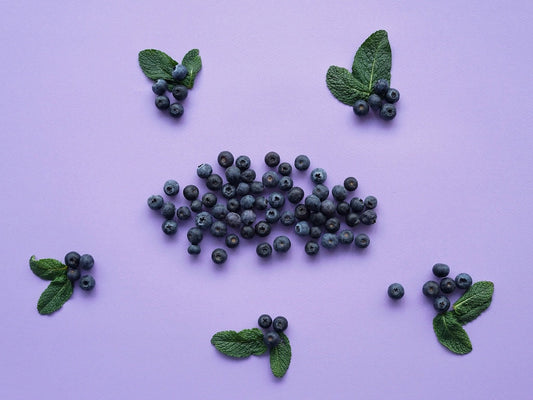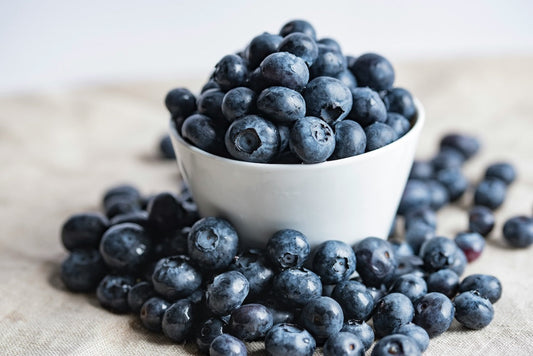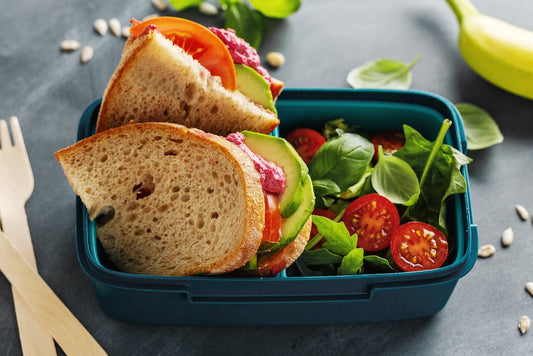Hey! Are you also a big fan of bananas? Who couldn't love this delicious and nutritious fruit? When it comes to a healthy snack, bananas are definitely at the top of the list. But have you ever wondered how many carbohydrates are in a banana? Find out more here!
Bananas are popular all over the world, not only because of their pleasantly sweet taste and practical portability, but also because of their rich nutritional profile.
These bright yellow fruits are true powerhouses, packed with important nutrients that promote your well-being and vitality. Let's delve deeper into the world of bananas and discover what they have to offer, especially in terms of carbohydrates.
All the details about bananas – read on!
Bananas and their carbohydrate content
Bananas are characterized by their significant carbohydrate content, which makes them a preferred source of energy, especially for athletes or as a quick source of strength in your everyday life. A medium-sized banana contains about 27 grams of carbohydrates, the amount of which varies depending on the ripeness of the fruit.
In green bananas, the carbohydrates are almost exclusively starch and resistant starch, but this starch is converted into sugars (glucose, fructose and sucrose) during the ripening process.
So if you want to eat the healthiest carbohydrates possible, eat raw, slightly unripe bananas. The fiber contained in bananas (2.6 grams of fiber per 100 grams of banana) is a form of carbohydrate that is neither digested nor absorbed by the body.
But what exactly are carbohydrates?
Carbohydrates are common substances in nature. They consist of carbon, hydrogen and oxygen. They are mainly found in plant-based foods. Fish, meat and other animal-based foods, on the other hand, contain only small amounts or none at all.
Carbohydrates should not be missing from your daily diet. Along with fats and proteins, they are the most important sources of energy for our bodies. Above all, they support the performance of the brain, organs and muscles.
They include all sugars and starches, as well as almost all dietary fibers. In Western industrialized countries, around 50 percent of total energy is consumed in the form of carbohydrates. 20 percent of this is consumed in the form of sugar.
What are good carbohydrates?
There are two categories of carbohydrates. The good or wholesome ones include all more or less unprocessed carbohydrate-rich foods. These still have their original fiber content.
At the same time, they have a low glycemic index. This means that they do not affect blood sugar levels as much as bad carbohydrates. These are mostly found in processed foods. Good carbohydrates are a great advantage for a healthy breakfast.
What are bad carbohydrates?
On the other hand, bad carbohydrates are also known as refined or isolated carbohydrates for a reason. They are mostly found in industrially processed foods. During processing, the fiber content is minimized as much as possible to increase the shelf life of the respective food.
Although this simplifies their use in the food industry, it does not exactly make the respective foods healthier. Products made from processed raw materials also belong to the bad carbohydrates.
These include, for example:
- granulated sugar
- white flour/white bread
- ketchup
- sodas
- sweets
- ready meals
Bad carbohydrates tend to cause severe blood sugar fluctuations. This is because they cause the blood sugar level in the body to rise rapidly. This can lead to food cravings and ultimately to obesity.
Type 2 diabetes and other health issues are also associated with excessive consumption of refined carbohydrates. Poor carbohydrates are real fatteners and should not be consumed in large quantities.
Carbohydrate daily requirement – read more now!
Bananas in different forms
Fresh bananas are known for their natural sweetness and soft texture, with a medium-sized banana containing about 27 grams of carbohydrates and around 105 kilocalories, as mentioned above.
By comparison, banana chips and dried bananas have a higher energy content due to the dehydration process. A 100-gram serving of banana chips can contain as many as 500 calories and about 58 grams of carbohydrates. This high calorie content makes them a high-energy snack option, but they should be consumed in moderation, especially if you are watching your calorie intake.
Dried bananas are a more concentrated source of sugar and calories than fresh bananas. They contain about 346 calories per 100 grams and thus provide an intense source of energy for on the go. However, you should be aware that the drying process also concentrates the sugar content, which can affect blood sugar levels if consumed excessively.
Bananas in everyday life
“Do you want a banana? Yes, yes, yes I do!” And preferably every day!
Bananas and their nutrients – when combined with other healthy foods, bananas help you to meet your daily requirement of essential nutrients. So if a balanced diet is important to you, you should definitely include them in your daily menu.
Why are bananas so attractively crooked?
Bananas – carbohydrates and Verival
With Verival products, you can always see exactly the nutritional values and thus also the carbohydrate values. There are many cereal mixtures and porridge varieties that can be perfectly rounded off with fresh bananas. There are no limits to your imagination.
Conclusion
Bananas offer a balanced mix of instant energy and long-lasting satiation, making them an ideal part of a balanced diet. They are not only “healthy” in the classic sense, but also practical for an active lifestyle. The vitamins and minerals in bananas, such as potassium and magnesium, also support heart health and muscle recovery.
Bananas – find out all the benefits!
Frequently asked questions
Are bananas good carbohydrates?
It is well known that bananas are healthy. The question of whether they are good carbohydrates can also be answered with a clear “yes”. Bananas offer a healthy mix of quickly available carbohydrates in the form of fructose and resistant starch, especially in green bananas. This type of starch works similarly to fiber and can help keep your blood sugar levels stable.
How many carbohydrates are in a whole banana?
An average banana weighs between 100 and 120 grams. It consists primarily of water and carbohydrates (about 23 grams of carbohydrates per 100 grams of banana) and contains only a small amount of protein and almost no fat. The carbohydrates in bananas are composed of fructose, starch and fiber, with the exact proportions varying depending on the degree of ripeness.
Are bananas fast carbohydrates?
Ripe bananas contain fast-acting carbohydrates that can quickly provide your body with energy. The high fructose content makes them an ideal source of energy before or after exercise.
Are bananas low carb?
Bananas are not ideal for a strict low-carb diet because they are relatively high in carbohydrates. However, in moderate amounts, they can be part of a balanced diet, even on a carb-conscious diet.
What role do bananas play in building muscle?
Bananas are a valuable source of carbohydrates and vitamins such as B6, which are important for building muscle. They provide energy for your workouts and support muscle recovery after exercise. You can also prepare bananas with oats and nuts.
How do bananas affect blood sugar levels?
The fructose in ripe bananas can raise blood sugar levels more quickly, while the resistant starch in green bananas causes a slower increase. The pectin and fiber content also helps to prevent blood sugar spikes. Combine bananas with oats for an extremely healthy meal in terms of blood sugar levels. Bananas provide quick energy, but unripe bananas in particular also keep your blood sugar level constant for longer.
Are bananas suitable in a low-carb diet?
In a low-carb diet, bananas are suitable in moderation. They can be consumed as part of a balanced diet, especially if you pay attention to the degree of ripeness, since green bananas contain less sugar. Furthermore, bananas are a true treasure trove of vitamins, such as vitamin C, vitamin A, vitamin B6, vitamin B1, vitamin K and vitamin B2, and antioxidants.
How many carbohydrates are in an average banana?
A banana contains about 23 grams of carbohydrates. This information refers to a medium-sized, medium-ripe banana. The value varies depending on the size and degree of ripeness. Carbohydrates provide the body with energy. They are important for many metabolic processes and your organs. Especially the muscles and the brain need a lot of carbohydrates. If the energy is not needed immediately, carbohydrates are converted into sugar or fat and stored.
What is the difference between the carbohydrate content of green bananas and ripe bananas?
Green bananas contain more resistant starch and less sugar, making them a slower-digesting source of carbohydrates. Ripe bananas have a higher sugar content and thus provide faster energy. Depending on what your body needs, you can supply it accordingly.
























